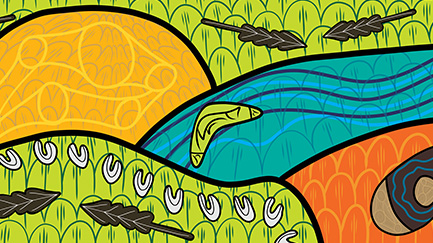
Recognising National Reconciliation Week 2025
In recognition of National Reconciliation Week, Mates4Mates is sharing the story of Aboriginal artist, Ma’sud Ghungarie Sanders who recently created a beautiful piece of artwork for their Head Office.

Post-Traumatic Stress Disorder (PTSD) is a prominent mental health issue for military veterans. It is commonly distinguished by a set of reactions that can develop in people who have been exposed to a traumatic event or series of events in their life.
These reactions are broken into 4 categories:
Alertness
Heightened awareness and constantly on the look-out for danger.
Reliving
Reliving traumatic events through memories and dreams, both of which are vivid and can feel very real.
Avoidance
Avoiding places and activities that could trigger reliving and alertness.
Numbness
Losing interest in things that may have previously bought joy or pleasure.
This is not an exhaustive list, but briefly touches on a few key reactions people with PTSD may experience. Symptoms vary from person to person and can change over time or from situation to situation. There is no right or wrong reaction and no normal timeline for PTSD to lessen or dissipate.
Depression and anxiety also go hand in hand with PTSD. In fact, more than 80% of veterans diagnosed with PTSD have both anxiety and depression. With this in mind, it is important to understand how to combat all three diagnoses when treating PTSD.
According to a systematic review by Whitworth and Ciccolo (2016), exercise has more of a positive impact on depression than anti-depressants, with none of the side-effects. This, however, is not to say you should go against recommendations of your psychiatrist, but that exercise can be a very effective alongside treatment.
According to research by Vancampfort et al (2016), people with PTSD are more likely to be physically inactive than the general population, as well as experience a 2-3x higher mortality rate. Meaning people with PTSD are dying much younger and more often than those without. Therefore, it is important that we look after ourselves and seek out methods of self-care to help maintain good health.
Physical activity significantly decreases symptoms of PTSD in Defence Force personnel. This is a fact that is supported by a systematic review by Rosenbaum et al (2015).
Exercise Physiologists (EP) are trained in understanding and managing symptoms of PTSD and assisting with developing programs to suit an individual’s needs. Mates4Mates are here to provide you with a safe environment to engage in exercise. If you want to get started on an exercise program, get in touch with one of our experienced EP’s.
Written by Exercise Physiologist Harley Fox.
References:

In recognition of National Reconciliation Week, Mates4Mates is sharing the story of Aboriginal artist, Ma’sud Ghungarie Sanders who recently created a beautiful piece of artwork for their Head Office.